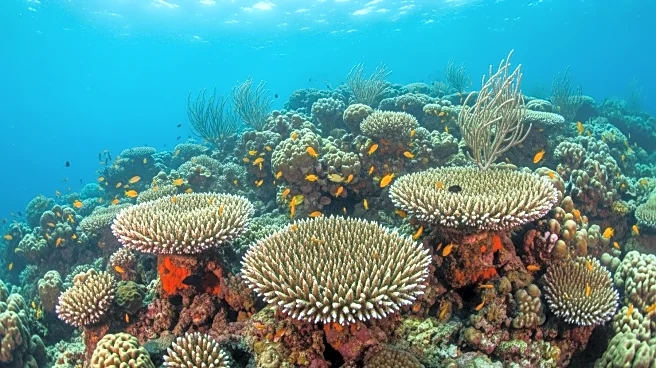What's Happening?
Coral reefs worldwide have reached a critical climate tipping point due to unprecedented global warming, according to a report by climate scientists at the University of Exeter's Global Systems Institute. The report highlights that over 80% of the world's coral reefs are experiencing mass bleaching, a process where heat stress causes corals to expel the algae that sustain them, leading to their deterioration. This marks the first environmental system to pass such a tipping point, signaling an 'unprecedented crisis' for marine ecosystems. The report emphasizes that coral reefs are vital for marine biodiversity, supporting a quarter of all underwater species and the livelihoods of nearly a billion people globally.
Why It's Important?
The degradation of coral reefs poses significant threats to marine biodiversity and human economies reliant on these ecosystems. Coral reefs are essential for maintaining marine life balance and provide economic benefits through tourism and fisheries. Their decline could lead to substantial economic losses and disrupt food security for communities dependent on reef-related activities. The report underscores the urgency for global leaders to address climate change aggressively, as the survival of coral reefs is crucial for both environmental and economic stability. Immediate action is needed to mitigate further damage and preserve remaining coral populations.
What's Next?
The report calls for immediate and unprecedented action from global leaders, particularly at the upcoming COP30 climate conference, to address the rapid approach of multiple Earth system tipping points. Efforts to decarbonize and reduce greenhouse gas emissions are critical to prevent further environmental degradation. The report also highlights the importance of preserving surviving coral pockets and minimizing warming progression. The shift towards renewable energy sources, such as solar and wind power, is identified as a positive step, but more comprehensive measures are necessary to avert further tipping points and their devastating consequences.
Beyond the Headlines
The report suggests that other environmental systems, like the Amazon rainforest and ocean currents, are nearing similar tipping points, which could lead to catastrophic global impacts. The melting of glaciers, such as the Greenland ice sheet, is already contributing significant freshwater to the oceans, affecting global weather patterns. The transition to renewable energy is seen as a positive development, but the urgency to transform societal energy bases away from fossil fuels remains critical. The report stresses the need for senior decision-makers to recognize the high likelihood of these events and act decisively to prevent further environmental crises.










